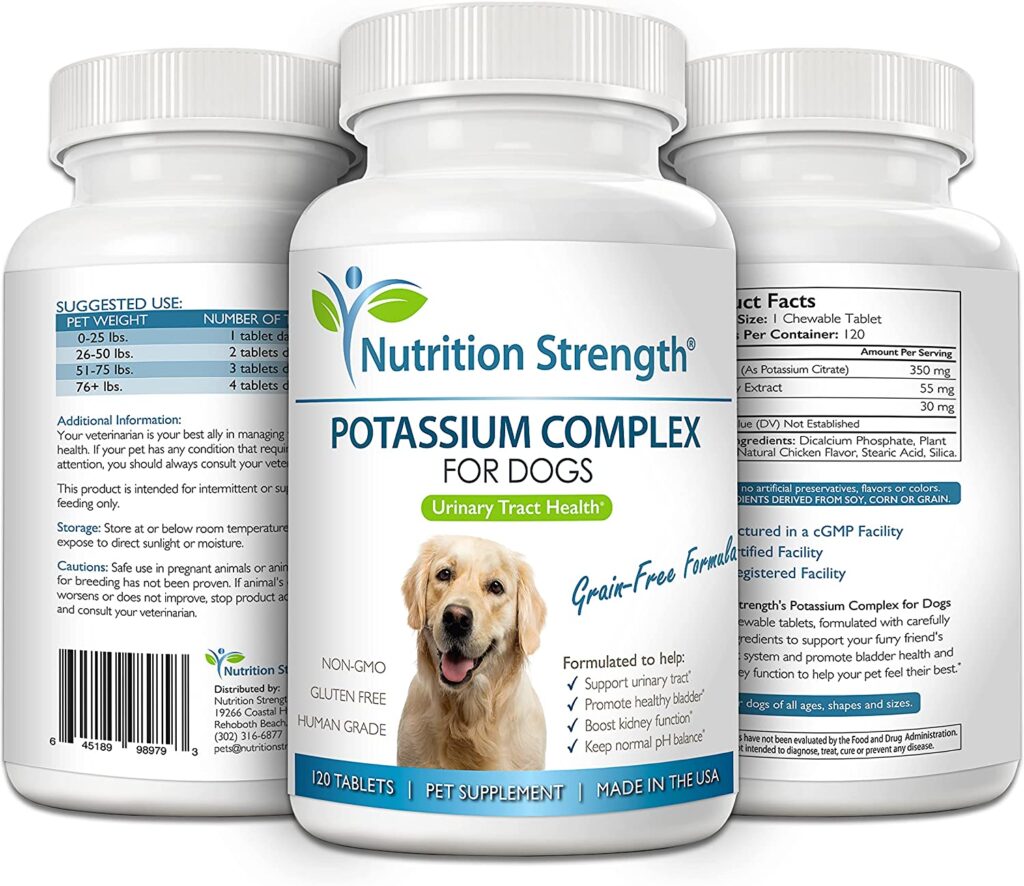Potassium for Dogs: Why Your Pet Needs It
Potassium for dogs is an essential element for normal physiological function and maintenance of homeostasis. This is true for both dogs and people, and sufficient levels of this mineral are vital for the wel-being of the organism.
This mineral is considered an electrolyte because of its strong reactivity with water. This implies that when this mineral dissolves in water, positively charged ions form, allowing it to conduct electricity. Potassium is crucial for fluid regulation, muscular contractions and nerve transmission.
So it’s clear why potassium is so important for dogs. It is also critical for humans and other living creatures for the same reasons. But how can you ensure that your dog’s blood potassium level is optimal? Do dogs need potassium generally? How do you keep your dog from being potassium deficient or having too much potassium in his blood?
Let’s start by learning more about potassium and then see what you can do to ensure your dog receives his minerals.
Table of Contents
- What Exactly Is Potassium?
- What Are the Safest Sources of Potassium for Dogs?
- What Is the Role of Potassium?
- What Are the Health Benefits of Potassium for Dogs?
- What Are the Signs of Potassium Deficiency in Dogs?
- How Can I Tell if My Dog Has a High Potassium Level?
- The Takeaway
- Nutrition Strength Potassium for Dogs
Check out our Nutrition Strength Potassium for Dogs here.
What Exactly Is Potassium?
The body’s cells contain more than 90 percent of the total potassium stored in the body. This implies that potassium must be in perfect equilibrium to perform its function in the body. Otherwise, when potassium levels are out of balance, the way cells function is severely harmed, perhaps leading to chronic health problems.
What are the methods for altering the potassium balance in your dog’s body? The best approach to guarantee that your dog gets enough potassium in his diet is to provide him foods that are high in this mineral.
Although potassium is best absorbed in the small intestines, it is often dissolved before reaching the intestines. If food is overdone or served poorly, it is exceedingly improbable to keep potassium in it.
So, for your dog to develop healthily, his potassium levels must be regulated entirely, and his daily potassium consumption must be assured.
What Are the Safest Sources of Potassium for Dogs?
Any kibble dog food should include a consistent level of potassium. Dog food is the primary and most crucial source of potassium for your pet.
However, dogs may need an additional dose of this mineral to get its advantages. If this is the case, potassium-rich supplements or meals may be beneficial. This step is critical for all dog owners who give their dogs a raw diet.
Let’s briefly go through some potassium-rich vegetables and fruits that your dog can eat:
- Bananas;
- Sweet potatoes;
- Broccoli;
- Oranges;
- Cantaloupe;
- Carrots;
- Pumpkin;
- Squash;
- Apples.
Incorporating these items into your dog’s diet will undoubtedly raise his potassium levels and ensure that all potassium-dependent processes are functioning appropriately. Let’s look at potassium’s most critical role in your dog’s health.
What Is the Role of Potassium?
To enhance your dog’s general health, you need first to understand what each mineral or vitamin accomplishes in his body. There’s no need to force all available nutrients into your puppy’s food to keep him healthy and lively.
So, before we go over the advantages of increasing your dog’s potassium intake, we have to go over what potassium is and what it does.
Potassium Regulates Fluid Balance
More than 60 percent of your dog’s body is made up of water. Therefore, that hydration is the foundation of all living things’ health. But what role does potassium play in this?
Potassium, along with sodium, aids our bodies in maintaining healthy water and acid-base balance in the blood. It is the primary electrolyte in intracellular fluid, which means it is a cell component. This fluid contains 40 percent of the water in your and your dog’s bodies. Extracellular fluid found outside the cells includes the remaining water.
The concentration of electrolytes, such as potassium and sodium, affects the quantity of water present in the intracellular or extracellular fluid, among other things. Electrolytes in the intracellular and extracellular fluid should be balanced in a healthy body. Potassium, in a nutshell, keeps your and your dog’s bodies hydrated.
Potassium Activates Nerve Impulses
Potassium also aids in the transmission of impulses from your brain to your body. These communications are really nerve impulses, which control the majority of bodily activities, such as muscle contractions and heartbeats.
The flow of ions in and out of cells generates nerve impulses. A nerve impulse is created by a change in the cell’s voltage when sodium ions flow and potassium ions migrate out of the cells.
This is why this mineral is essential for your dog’s nervous system to stay healthy.
Potassium Regulates Muscle and Heart Contractions
As previously stated, to have controlled muscular contractions, appropriate nerve activity is required. The transport of ions in the cells is excellent when potassium levels in the blood are balanced, which supports a regular heartbeat and proper muscular contractions.
On the other hand, high potassium levels might decrease the heart’s function and cause an irregular pulse. Low potassium levels in dogs have a similar effect on how the heart contracts.
Overall, insufficient potassium weakens the strength of all muscles, which may lead to heartbeat abnormalities and other cardiac problems.
What Are the Health Benefits of Potassium for Dogs?
Now that we’ve established potassium’s job in the body, we can discuss its advantages. Of course, too much of anything may be harmful to your dog’s health, so only increase potassium consumption if your dog is already deficient in the mineral.
Some substances that contain potassium may benefit your dog’s health. For example, potassium citrate for dogs decreases the chance of kidney stone formation. If your puppy is deficient, you can use potassium gluconate for dogs. That form is one of the most appropriate ever used.
When a dog’s potassium levels are balanced, he will likely benefit from the following health advantages.
Better Muscle Growth
Potassium influences your dog’s general muscular strength and development by assisting muscles in contracting and relaxing. Your dog will have strong motor abilities if his potassium levels are well-balanced.
This mineral promotes your puppy’s healthy development. Increased potassium consumption might be a brilliant method to support your dog’s strength if he exercises so much.
Healthy Heart
Potassium affects your dog’s heart health because it plays a crucial function in muscle contractions. If the amounts of this mineral are balanced, the heart should have a regular beating and, consequently, proper blood flow.
Boosted Metabolism
This vital mineral may also help your dog digest food. Potassium’s electrolyte property aids in the quicker absorption of nutrients. The mineral is necessary for the breakdown of lipids and carbohydrates in the digestive system.
Healthy Nervous System
Potassium aids in the generation of nerve impulses in your dog’s body. Therefore it has a direct impact on his cognitive performance. When your dog’s body receives adequate potassium, he may be able to learn and remember more quickly. This crucial mineral, when in balance, will keep your dog’s sharpness at its best.
Stronger Bones
As if that wasn’t enough, it was discovered that dogs with adequate potassium levels had better bone density. This is because potassium regulates acid levels, influencing the internal pH value. It was also shown that dogs with balanced acid levels retain more calcium in their bones and blood.
What Are the Signs of Potassium Deficiency in Dogs?
Excess potassium loss is the most common cause of potassium insufficiency in dogs. Potassium levels seldom decline due to a low intake of the mineral. These bodily states may occur when a dog has specific health issues that make maintaining adequate potassium in the body very challenging.
If your dog exhibits any of the symptoms listed below, you should take him to the veterinarian for blood tests. The findings will reveal whether or not your puppy’s potassium levels are balanced.
A dog with a deficiency will have one or more of the following symptoms of low potassium in dogs:
- Chronic diarrhea;
- Chronic vomiting;
- Kidney disease;
- Cardiac arrest;
- Loss of appetite;
- Increased urination;
- Increased thirst;
- Poor growth;
- Weakness;
- Muscle pain;
- Lethargy.
Hypokalemia is when the body’s potassium levels are too low. It may be caused by various factors, and it doesn’t usually happen in healthy dogs.
Dogs with certain chronic health disorders, such as diabetes, are more likely to develop hypokalemia. The treatment includes additional supplementation. The recommended dose of potassium dosage for dogs is at least 20 mg a day.
How Can I Tell if My Dog Has a High Potassium Level?
Dogs may have excessive potassium in their blood, just as they can have a potassium deficit. Excessive quantities of this mineral create symptoms utterly different from those caused by potassium shortage. What’s comparable, though, is that this illness is seldom seen in otherwise healthy dogs.
The following are the signs of a dog with high potassium levels in dogs:
- Arrhythmia;
- Weakness;
- Collapse;
- Limp paralysis.
Hyperkalemia is a condition in which potassium levels are more significant than usual. Hyperkalemia is most common in dogs with kidney problems since these organs are responsible for removing potassium and acidity.
Hyperkalemia may develop quickly when a dog’s kidneys and renal function for potassium removal are impaired by another disorder. This disease might lead to potentially severe cardiotoxicity in certain circumstances. Exhaustive exercise was also shown to be a component that increases the risk of hyperkalemia.
The Takeaway
Dogs prone to low blood potassium levels may benefit from taking potassium supplements in various ways. Pet owners may find that their dog has improved strength and reflexes.
Potassium supplementation in dogs may help speed up muscle growth. In addition to enhancing bone density and reducing osteoporosis-related fractures, potassium supplementation may benefit older dogs.
Taking a potassium supplement in healthy dogs on a nutritionally balanced diet is unlikely to change since they will excrete what they don’t need in their urine.
Consult your veterinarian to determine the precise quantity of potassium your dog need before supplementing. In this manner, you can be confident in your pets’ health.
Nutrition Strength Potassium for Dogs
Check out our Nutrition Strength Potassium for Dogs here.
Nutrition Strength Potassium for Dogs to Support Urinary Tract, Promote Healthy Bladder, Normal pH Balance & Kidney Function with Potassium Citrate for Dogs, Cranberry, Vitamin C, 120 Chewable Tablets are tasty chewable tablets, made with carefully selected ingredients, which have been shown to help support your furry friend’s urinary tract system and promote bladder health and normal kidney function to help your pet feel their best.
A great way to support your furry friend’s well-being, our premium potassium citrate for dogs could benefit your pets by helping to:
- Support the urinary tract.
- Promote a healthy bladder.
- Boost the kidney function.
- Keep a normal pH balance.
- Stimulate UT detoxification.
Our carefully formulated dog potassium supplement is designed to help ensure that your pet gets sufficient levels of this potassium citrate for dogs, which is a salt that has been recommended for administration to dogs and cats with persistently acidic urine.
Potassium citrate is an alkalinizing salt, which has been shown to benefit dogs with persistently acidic urine.
Cranberry extract has long been administered to dogs, as well as to us humans, as it has been found to promote urinary tract health.
Supplementation of vitamin C for dogs has been shown to help maintain a healthy urinary pH.
Image source: Wikimedia / Don DeBold.




